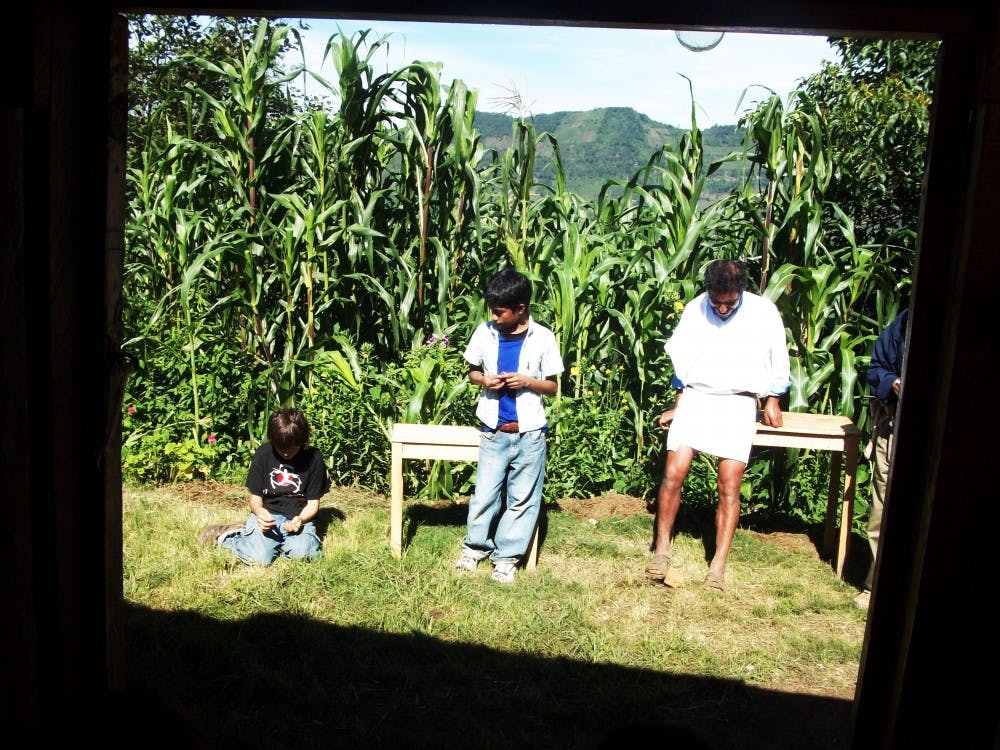Editor’s note: The opinions expressed in this column are solely those of the author.
Our immigration policy is a mess. I know this because I’ve seen its effects first hand.
The Cross-Border Issues Group, a journalism program at UNM, travels every summer to Mexico and Central America to study, well, cross-border issues – that is to say, immigration.
One thing is made clear to everyone who travels with the group: The current immigration policy in the United States constitutes a horrible violation of human rights. Every single day, people are killed trying to enter our country. Their only crime was searching for an honest job.
Many come to our country fleeing violence spread by narco-traffickers and gangsters. Since their passage is made illegal, they are forced to expose themselves to further violence while attempting to cross the border.
The level of violence in Mexico and Latin America is escalating every day, thanks in large part to U.S. policy.
All of this is common knowledge, known by everyone from politicians to pundits. But the Cross-Border Issues Group trip opened my eyes to some more obscure facts of border policy and Hispano American culture:
Restrictive immigration policies encourage organized crime.
Los Zetas, an enforcement group for a drug cartel, regularly attacks trains to steal phone numbers.
In case that doesn’t make sense, here’s a little background: Mexico’s immigration policy mirrors ours. Unemployed citizens of Central American countries (in other words, the ones that most need to make the trip north) are rarely given Visas to travel or work in Mexico, meaning that before they get anywhere near the U.S. border, they have to illegally cross the border in southern Mexico. Then they have to cross all of Mexico to reach the United States.
Trains are the most common means of travel when crossing Mexico illegally. Undocumented migrants, of course, have neither the money nor the necessary paperwork to ride a passenger train. So they climb on top of cargo trains.
Almost everyone I spoke to who had ridden on top of a train was attacked by the Zetas. They come out of the jungle and jump onto the train, forcing the passengers off. Many migrants die during these attacks. The Zetas empty everyone’s pockets, stealing everything of value. The main prize they are looking for is a phone number of a friend or relative in the U.S.
Phone numbers are like gold to the Zetas, because they allow a profit to be made from a kidnapping. Without phone numbers, there are no loved ones to extort for money in exchange for a prisoner’s release.
It’s impossible to estimate how much money the Zetas make doing this, but given the number of attacks (hundreds a year, at least) it’s clearly a profitable business. The sane observer will immediately note that, were the people on the trains allowed to cross legally, this particular market would disappear, thereby draining power from one of the most powerful criminal organizations in Latin America. It’s important to remember that the victims in this situation, the migrants, are not criminals. They simply want to work.
It’s our government’s fault that so many Central Americans leave their countries.
Examples of this can be counted by the hundreds, so I’ll focus on the clear-cut story of the Maras in Honduras.
A mara is a street gang, making money through robbery, kidnapping and assassinations. Thirty years ago, they did not exist. Although they are now based in Central American countries, such as Honduras and El Salvador, their roots can be traced to Los Angeles.
In the 80s, a tightening of immigration policy created a new social class in L.A.: undocumented Hispano Americans.
They couldn’t legally work in the United States, and they were often afraid to send their children to school in case they were discovered as illegals. The situation created an incentive for adults unable to find work and marginalized teenagers with low levels of education to turn to criminal activities.
Two principal gangs emerged among undocumented immigrants in California: MS-13 and Calle 18. When members of these gangs were caught, they were summarily deported back to their “home” countries.
Since many of them had come to the U.S. as infants, they were often without contacts once deported to Central America. So, in order to survive, they relied on each other, and the gangs were transported to Central America as their members were deported from the U.S.
Honduras has one of the countries with the highest concentrations of Maras — almost everyone you meet has had contact with them. The streets of Tegucigalpa, Honduras’ largest city, are deserted as soon as the sun goes down.
The nights belong to the Maras, and anyone not affiliated with them knows not to risk being caught on the street at 8 p.m. Most of the Honduran migrants we spoke with were fleeing their country to escape the Maras. The typical story is “There is no work in Honduras. The only way I could make enough money to eat was to go to work for the Maras. I knew I had to do things I didn’t want to in order to survive, but when they asked me to kill my brother (or a policeman, a little girl, etc.) I couldn’t do it. When I told them no, they said they would kill me. So I left.”
These people joined gangs because they had no other option. There was no other source of money in their country. And when they decided they couldn’t do it anymore, they had no option but to leave. Thanks to U.S. and Mexican immigration policy, this decision is also criminalized.
Deporting them has a nil-net effect. “What will you do if you’re caught and deported?” “Well, I will come back, of course. I cannot stay in Honduras or I will be killed.” Also common: “This is the third time I’ve made the journey. I will come back again and again each time I’m deported. I have no other choice.”
Current immigration policy is unsustainable, in all senses of the word.
We will run out of money if we keep building border defenses at the rate we are now. Various studies have estimated that the number of Border Patrol agents needed to actually secure our southern border is roughly equal to the number of troops currently deployed in Iraq.
The wall along the border costs an estimated $3 million dollars per mile, according to a 2006 NPR report. Border Patrol agents say the net effect of the wall, a small obstacle compared to the dangers already inherent in the passage, is to delay migrants by about five minutes.
Between bank bailouts and two wars, we don’t have anywhere near enough money to build the entire wall and staff the border to capacity. Our efforts at border security are analogous to Don Quixote tilting at windmills — police action against people that are not criminals, with no effect on the numbers actually coming over. We will not stop people from migrating here. We will not be able to deport everyone who is already here. Our efforts are worthless.
Remittances home, or in other words people sending money to their families, accounted for, at a low estimate, $21.5 billion in Mexico in 2009. Our economy is inextricably linked to theirs, starting with oil and moving on down from there.
If Mexico stops receiving that money, the chain reaction will certainly set off another financial crisis here.
Finally, this policy is unsustainable because people will not accept being treated like this forever. These are honest people treated like criminals on the basis of their place of birth and the color of their skin. There are millions and millions of them. More come every day. They represent a fast growing minority that will not be abused forever.
The beginnings of a new civil rights movement are being sparked right now in Latino communities across the country. Maybe SB1070 in Arizona will turn out to be the tipping point that changes our immigration policy forever, or maybe it will be the next high-profile racial/fascist measure. But change is coming.
A big problem with the debate on immigration reform is that it’s impossible to describe how horrible the situation actually is.
There’s just no way to communicate the feeling of talking with a 19-year-old who lost his leg falling off the train.
Words simply cannot express how depressing it is to see this giant wave of people starving and crippled, with very little hope that things are going to get better. Without actually meeting them, you will never understand exactly how horrible one’s life must be in order for them to make the decision to leave their home, to embark on this journey that will probably maim or kill them.
There’s no possibility of conveying the sadness of some of these stories: the guy who escaped his kidnappers only to be lost in the Arizona desert without water for five days; the soft-spoken, kind-hearted man whose jaw was broken in four places when gangsters stole his backpack.
Without speaking to them, the point will never be driven home that things cannot continue like this. It’s too horrible to believe that our country will keep supporting the conditions that do this to innocent people. There’s an important corollary to this fact.
If you don’t speak Spanish, you should keep your mouth shut about immigration.
You are incapable of understanding the words of the principal actors shaping these events. You are therefore unable to formulate a valid opinion. Please shut up. The world will be a better place if you do.
Get content from The Daily Lobo delivered to your inbox






